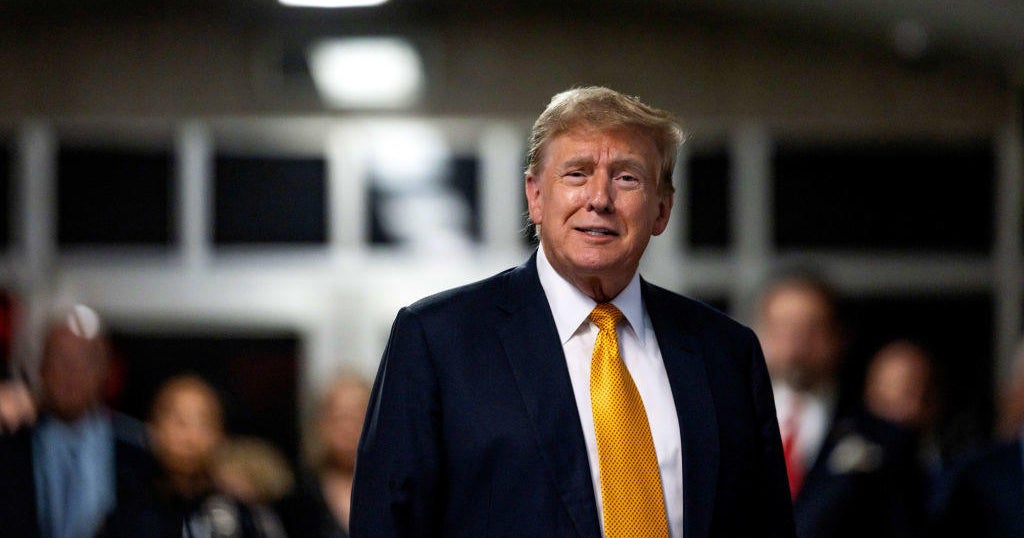
When the judge overseeing Donald Trump’s criminal trial found on May 6 that Trump had violated a gag order for a 10th time, he told him that “the last thing I want to do is to put you in jail.”
“You are the former president of the United States and possibly the next president, as well,” said Justice Juan Merchan, reflecting on the momentous weight of such a decision.
Whether to jail the Republican Party’s presumptive nominee for president is a choice that Merchan may soon face again, if jurors in Trump’s “hush money” case vote to convict him. Closing arguments and jury deliberations start this week.
What exactly would happen if the jury finds Trump guilty is difficult to predict. Trump is being tried in New York state court, where judges have broad authority to determine when sentences are handed down after convictions and what exactly they will be, according to former Manhattan prosecutor Duncan Levin. That differs from federal court, where there’s typically a waiting period between a conviction and sentencing.
“It’s much more informally done in state court. I’ve had cases where the jury comes back and says, ‘guilty,’ and the judge thanks the jury, and excuses them, and says, ‘Let’s sentence the defendant right now,” said Levin. “Obviously, everything’s a little different about this case than the typical case.”
Each of the 34 felony falsification of business records charges that Trump is facing carries a sentence of up to four years in prison and a $5,000 fine. He has pleaded not guilty.
Norm Eisen, an author and attorney, recently analyzed dozens of cases brought by the Manhattan District Attorney’s Office in which falsifying business records was the most serious charge at arraignment. He found that roughly one in 10 of those cases resulted in a sentence of incarceration. But he also cautioned that those prosecutions often involved other charges and noted the dynamics at play in Trump’s case make his sentence particularly hard to forecast.
If Trump is found guilty, Merchan would have fairly wide leeway in determining a punishment, including sentencing Trump to probation or house arrest.
Levin said the option of confining Trump to his home, followed by a period on probation, might be appealing to Merchan, who has repeatedly indicated he’s concerned about limiting a presidential candidate’s ability to speak freely. Such an option would allow Trump to do interviews and access social media from his home.
From the day Trump was first arraigned, on April 4, 2023, Merchan has said he was loath to interfere with Trump’s ability to campaign.
“He is a candidate for the presidency of the United States. So, those First Amendment rights are critically important, obviously,” Merchan said that day.
And on May 6, he opined more broadly on the additional people who would be burdened by jailing Trump.
Merchan called incarceration “truly a last resort for me,” saying, “I also worry about the people who would have to execute that sanction: the court officers, the correction officers, the Secret Service detail, among others.”
Still, that day, he cautioned Trump that jail is not out of the question.
“I want you to understand that I will, if necessary and appropriate,” Merchan said.
It’s a possibility that officials in state and federal agencies have begun preparing for, according to a New York corrections source, who said the Secret Service has met with local jail officials. As a former president, Trump is entitled to Secret Service protection for the rest of his life, wherever he happens to be. Behind bars, corrections officers would in turn be responsible for protecting those agents assigned to Trump.
Where Trump might serve any sentence jail or prison sentence is one of many factors that remains up in the air. Shorter sentences can be served at the city’s Rikers Island Jail Complex, which has two wings that are typically used for high-profile or infamous inmates. (Neither, of course, has ever held someone who comes with his own security detail.)
Officials must have a plan in place, just in case, said Levin.
“He could be remanded on the spot,” Levin said.
Katrina Kaufman contributed reporting.
